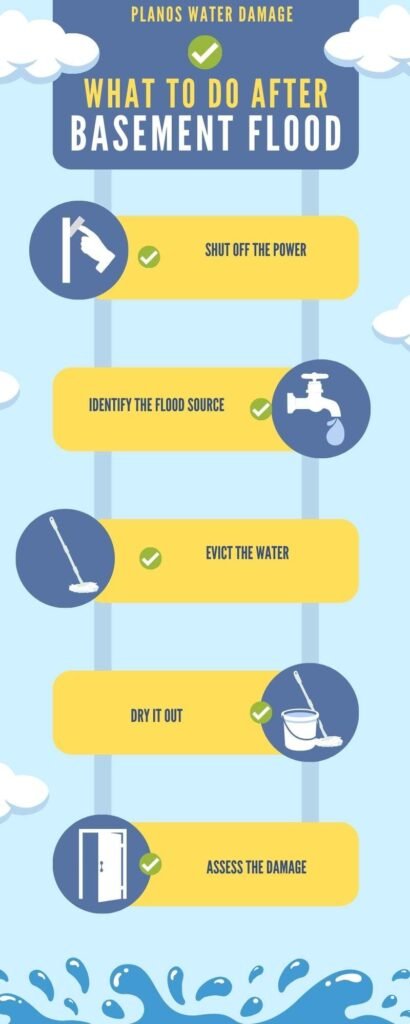As a homeowner, the sight of a flooded basement is nothing short of a nightmare. It’s like watching a horror movie, but you’re the star, and the villain is water damage.
Not only is it a logistical nightmare, but it’s also a safety hazard. Water damage can lead to mold growth, which is a silent health threat.
But don’t worry, we’re here to help you sail through this mess. Here are some practical steps you can take to tackle a flooded basement and prevent the sequel.
Key Takeaways
- Understanding the cause of basement flooding is crucial in preventing future flooding.
- Shutting off the power and wearing protective gear are the first steps to take when dealing with a flooded basement.
- Regular maintenance and inspections can help prevent future flooding.

Understanding Basement Flooding
Basement flooding is like that uninvited guest that shows up at the most inconvenient time. It can happen due to heavy rain, melting snow, or a burst pipe. It’s critical to diagnose the cause of the flooding so that you can take the right measures to prevent a repeat performance.
When it rains cats and dogs, the ground can become oversaturated with water, which can then sneak into your basement through any cracks in the walls or floor.
This stealthy invasion can lead to standing water and potential damage to your belongings and home.
Another sneaky cause of basement flooding is hydrostatic pressure. This happens when water piles up in the soil around your home, putting your basement walls under pressure.
Over time, this can cause cracks and leaks, leading to water intrusion.
When you find yourself face-to-face with a flooded basement, it’s crucial to act swiftly. Start by shutting off the power and gas in the area to avoid any shockers (literally) or gas leaks.
Next, try to determine where the water is coming from is it due to a torrential downpour, a busted pipe, or another issue?
Prevention is better than cure, they say, and they’re right. Make sure your basement is well-prepared to weather any storm.
This could mean installing a sump pump, sealing any cracks in the walls and floor, and ensuring proper drainage around your home.
Also, consider investing in flood insurance because standard homeowners insurance policies often don’t cover flood damage.
Immediate Action to Basement Flooding
If you stumble upon a flooded basement, it’s time to roll up your sleeves and take immediate steps to minimize the damage. Here’s your quick action plan:
1. Shut off the power: Safety first! Ensure the power is turned off before stepping into the flooded basement. If you’re unsure how to do this, call up a professional electrician.
2. Identify the flood source: If it’s a burst pipe or a malfunctioning sump pump, turn off your home’s main water supply. If Mother Nature is behind the flooding, wait for the storm to pass before venturing into the basement.
3. Evict the water: Use a wet/dry vacuum or a pump to bid goodbye to the water. Don your rubber gloves and boots to avoid contact with contaminated water.
4. Dry it out: Get fans and dehumidifiers working overtime to dry out the basement. Open up the windows and doors to let in some fresh air and speed up the drying process.
5. Assess the damage: Once the basement is dry, it’s time to take stock of the damage. Water damage restoration professionals can help you gauge the extent of the damage and suggest suitable repairs.
Remember, time is of the essence when dealing with basement flooding. The longer you wait, the more damage it can do. So, take swift action to minimize the damage and restore your basement to its pre-flood glory.
A flooded basement might seem like an overwhelming problem, but with the right knowledge and swift action, it’s totally manageable. So, put on your superhero cape and face the challenge head-on.
Preventing Future Flooding
Preventing your basement from turning into an indoor pool is a crucial step in safeguarding your home from expensive damages. Here are a few simple steps you can take to keep your basement high and dry:
- Keep a close eye on your gutters and downspouts . Regular inspections will ensure they are free of leaves, twigs, and other debris that can cause water to pool around your home’s foundation.
- Consider installing gutter guards . These handy devices will prevent debris from clogging your gutters and downspouts, directing water away from your home.
- Ensure your sump pump is in good working condition and has a battery backup ready for power outages. This is your basement’s first line of defense against flooding.
- Check your basement window wells regularly . Good drainage and covers can prevent debris from accumulating and causing water to back up.
- Give your foundation a once-over regularly . If you spot any cracks or damage, get them repaired promptly to prevent water from seeping in.
- Think about installing a floor drain or a backwater valve . These can prevent sewage backup and other unpleasant surprises.
- If you have appliances in your basement like a water heater, consider elevating them on a platform . This will protect them from water damage in case of flooding.
Heavy rainfall calls for extra precautions . If you live in an area prone to flooding, waterproofing your basement can provide an extra layer of protection. By taking these preventative measures, you can significantly reduce the risk of future basement flooding and protect your home and belongings.
Dealing with Flood Damage
If your basement has already taken the plunge, it’s important to act swiftly to minimize the damage. Water damage can lead to a host of problems, including mold growth, structural damage, and health hazards. Here’s what to do if you find yourself in deep water:
- Safety first: Before stepping into a flooded basement, ensure it’s safe. If there’s standing water, switch off the power to your home. Don a pair of gloves, boots, and a mask to protect yourself from harmful substances that might lurk in the water.
- Water removal: The first step to recovery is to remove the water. Use a wet/dry vacuum or a pump to extract as much water as possible. If the water is too deep, call in a professional restoration company.
- Dry it out: Once the water is out, make sure to thoroughly dry the area. Use fans, dehumidifiers, and open windows to promote air circulation and speed up the drying process. This can prevent mold growth and further damage to your property.
- Clean and disinfect: After drying the area, clean and disinfect all surfaces that had contact with floodwater. Floodwater often carries harmful substances like sewage and chemicals. Use a mix of bleach and water to disinfect surfaces.
- Check for damage: Look for any signs of damage such as cracks in the foundation or walls. Water can weaken your home’s structure, so address any damage as soon as possible.
- Contact your insurance company: If you have flood insurance, report the damage and start the claims process. They can guide you on what is covered and what steps to take next.
Dealing with flood damage can feel overwhelming, but taking prompt action can help mitigate the damage and prevent further problems. Safety should always be your first priority and don’t hesitate to call in professionals when necessary.
Health Risks and Safety Measures
When your basement floods, it’s crucial to act immediately to prevent health risks and ensure your safety. Here are some key measures you need to consider:
Public Health
Floodwater often carries bacteria, viruses, and other harmful substances. Exposure to these contaminants can lead to serious health problems, like gastrointestinal illness, skin infections, and respiratory problems.
Avoid contact with floodwater as much as possible. If unavoidable, wear protective clothing and wash your hands thoroughly after.
Mold
Mold thrives in damp environments and can cause allergic reactions and respiratory problems. Remove standing water as soon as possible and dry out the area thoroughly.
If you spot signs of mold, like discoloration or a musty odor, get professional help.
Electrical Shock
Water and electricity are a dangerous combination. Water can damage electrical wiring and appliances, creating an electrocution hazard.
Turn off the power to your basement before entering a flooded area. If unsure, get an electrician to help.
Standing Water and Water Removal
If your basement is flooded with standing water, it’s crucial to remove it as soon as possible to minimize damage. Use a wet/dry vacuum or sump pump to extract the water. Wear rubber boots and gloves during removal to avoid contact with contaminated water. Remove any soaked rugs, carpets or furnishings. Extract any trapped water underneath by lifting edges. If needed, contact a professional water damage company for extraction assistance. Thoroughly removing standing water is the first step in flooded basement cleanup.
Prevent basement flooding
Preventing basement flooding starts with keeping water away from your foundation. Inspect your gutters and downspouts and clear any debris. Consider installing gutter guards as well. Check that downspouts direct water away from your home’s foundation. Fill any cracks or holes in your foundation or basement walls to prevent seepage. Install a sump pump and test it regularly, ensuring it has a battery backup. Waterproof your basement walls and flooring if you live in a flood zone. And make sure window wells have proper drainage. Taking these preventative measures will help keep your basement dry and avoid costly flood damage.
Frequently Asked Questions
How do I dry out a flooded basement?
First, remove all water using a wet/dry vacuum or pump. Then, use fans and dehumidifiers to dry out the affected area. This will prevent mold and mildew.
What is the best way to clean up after a basement flood?
Remove all water first, then any affected carpet or padding. Disinfect the area to eliminate any potential bacteria. Use fans and dehumidifiers to dry out the area, preventing mold and mildew.
How do I remove water from my basement?
Use a wet/dry vacuum or pump for water removal. You can also hire professionals like Roto-Rooter, who have the proper extraction equipment.
Is it safe to stay in a house with a flooded basement?
No, flooded basements can contain harmful bacteria and chemicals posing health risks. Evacuate the area until the floodwater has been removed and the area cleaned and disinfected.
Remember, water damage can be a daunting task to handle alone. Don’t hesitate to call in professionals to help navigate these murky waters. Stay dry!
